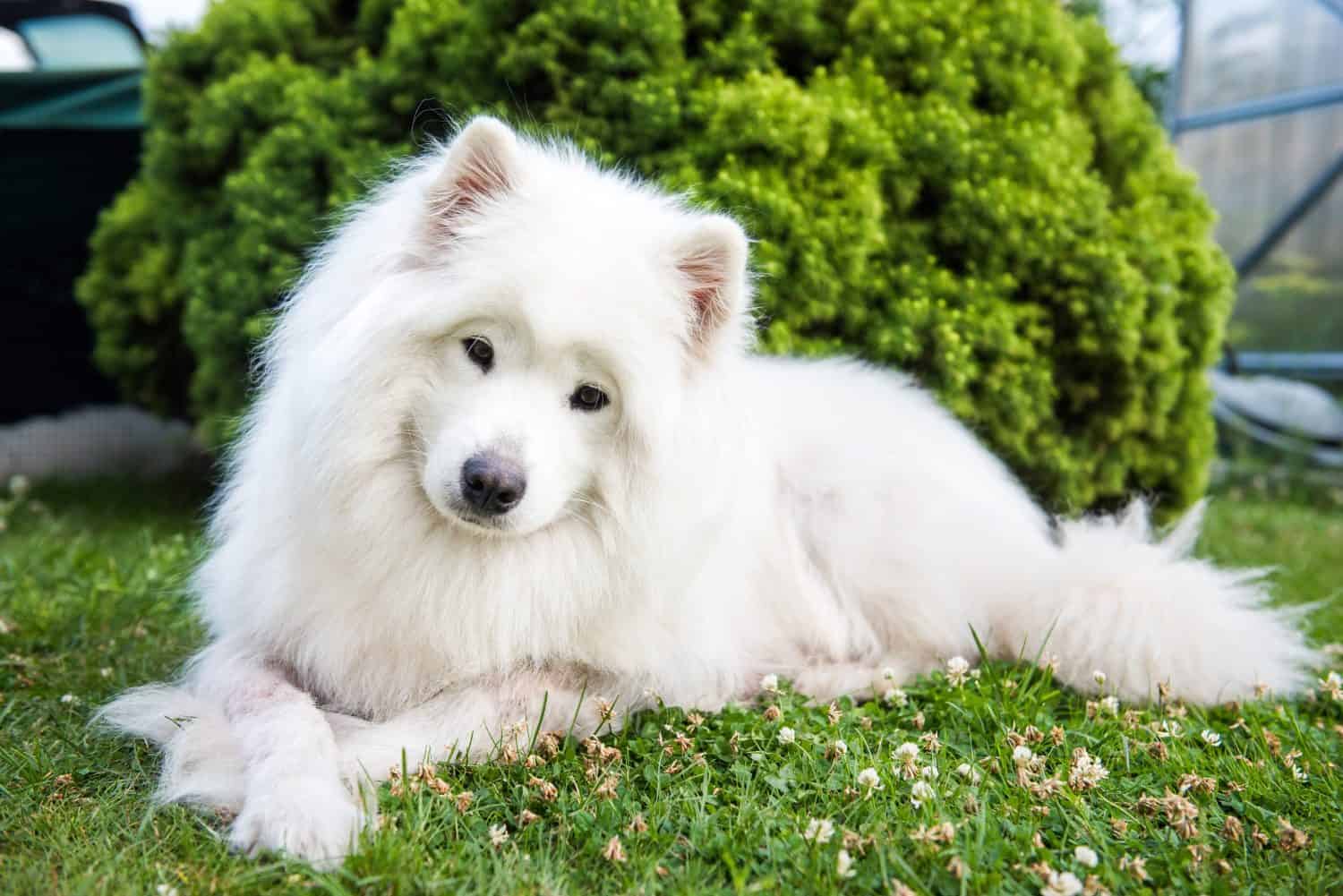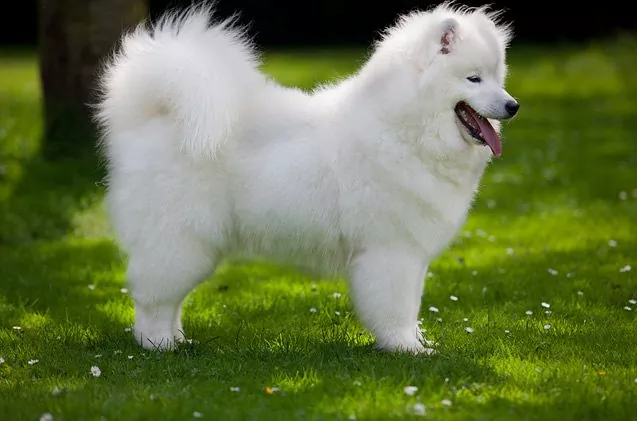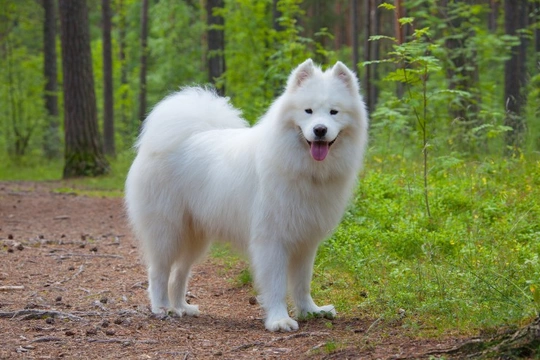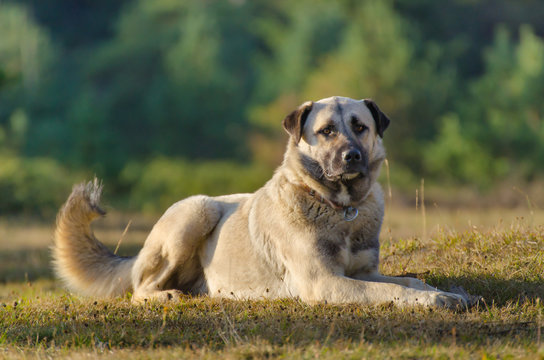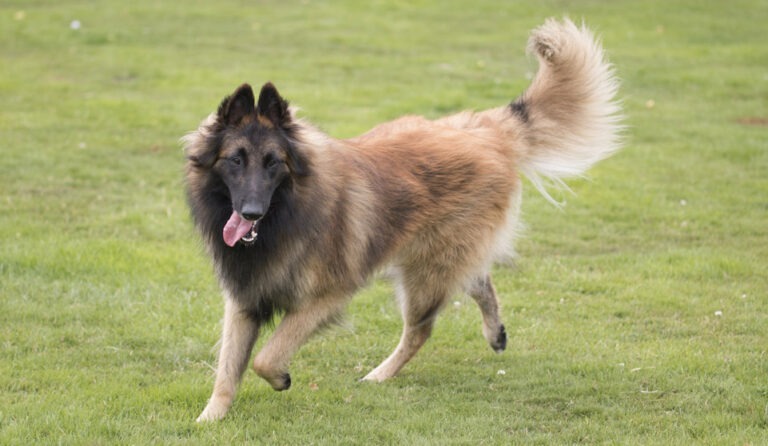Samoyeds Are aloyal and friendly companion that will always put a smile on your face. These charming working dogs are known for their distinct smile and gentle nature, making them perfect family pets. With their striking white coats and playful personalities, Samoyeds have captured the hearts of dog enthusiasts worldwide. In this article, we will explore the history, characteristics, and unique qualities of Samoyeds, shedding light on why they are such beloved and sought-after furry friends.
History and Origins of Samoyeds
Origins in Siberia
Samoyeds have a fascinating history and originate from the remote regions of Siberia. The breed gets its name from the Samoyedic people, who were nomadic reindeer herders and hunters. These indigenous people relied heavily on their loyal and versatile Samoyed dogs for survival in the harsh Arctic environment. The Samoyedic people treated their dogs as cherished family members, and the bond between them was incredibly strong.
Samoyeds have a long history of serving as working dogs in Siberia. They were invaluable to the Samoyedic people for various tasks such as herding reindeer, pulling sleds, and guarding their camps. These dogs were not only highly efficient at their jobs but also exhibited a friendly and gentle nature, making them excellent companions for the entire family. Their thick double coat provided insulation against the extreme cold, allowing them to withstand the harshest weather conditions.
Introduction to the Western World
The Western world first became aware of Samoyeds in the late 19th century when Arctic explorers and traders encountered these remarkable dogs during their expeditions. Amazed by their beauty, intelligence, and friendly disposition, the explorers quickly recognized the potential of Samoyeds beyond their working capabilities. They brought some of these dogs back to Europe and the United States, leading to the introduction of Samoyeds to the Western world.
Soon, Samoyeds gained popularity among dog enthusiasts and were sought after as show dogs and companions. Their striking appearance, with their characteristic friendly smile and fluffy white coat, captured the hearts of many. The breed’s adaptability to various climates and their inherently sociable nature made them a perfect fit for families and individuals looking for an affectionate and loyal pet.
History and origins of Samoyeds can be traced back to Siberia, where they played a vital role as working dogs for the Samoyedic people. Their introduction to the Western world opened up new opportunities for them, allowing their unique qualities to be appreciated by a broader audience. Today, Samoyeds continue to be beloved for their friendly nature, working abilities, and captivating smiles.
Physical Characteristics
Distinctive Appearance
Samoyeds are easily recognizable due to their distinctive appearance. They have a beautiful, smiling face with almond-shaped eyes that give them a friendly and approachable expression. One of their most remarkable features is their erect and alert ears, which add to their overall charming appearance. Additionally, their faces are framed by a thick double coat, enhancing their adorable and fluffy appearance.
Coat and Colors
The Samoyed breed boasts a luxurious and dense double coat, designed to protect them from harsh weather conditions. Their outer coat is long, coarse, and straight, while their undercoat is soft and dense. This combination provides insulation and keeps them warm in cold climates. The coat also serves as a shield against moisture, preventing the dog from getting wet easily.
Samoyeds come in various colors, but the most common coat color is pure white. However, they can also have cream or biscuit-colored markings on their ears and around their face. The white color of their coat not only adds to their stunning appearance but also helps reflect the sun’s rays, keeping them cool in warmer weather.
Size and Weight
Samoyeds are medium to large-sized dogs, known for their sturdy build and impressive strength. On average, males stand between 21 to 23.5 inches (53 to 60 cm) at the shoulder, while females range from 19 to 21 inches (48 to 53 cm). In terms of weight, adult males typically weigh between 45 to 65 pounds (20 to 29 kg), while females weigh slightly less, ranging from 35 to 50 pounds (16 to 23 kg).
Despite their size, Samoyeds have a graceful and agile presence, which contributes to their working dog capabilities. Their well-proportioned bodies and muscular build allow them to efficiently perform various tasks, such as pulling sleds or herding livestock.
Temperament and Personality
Friendly and Gentle
Samoyeds are known for their friendly and gentle nature. They have a natural affinity towards people and are often referred to as the “smiling” dogs due to their ever-present happy expressions. This breed is inherently friendly towards strangers and enjoys meeting new people. With their welcoming disposition, Samoyeds make excellent family pets and are particularly great with children. They have a patient and tolerant nature, making them ideal companions for households with young kids.
Intelligent and Trainable
In addition to their amiable nature, Samoyeds are highly intelligent and trainable dogs. They possess a quick wit and can learn new commands and tricks with ease. Their high level of intelligence enables them to excel in various training activities, including obedience training and agility courses. Samoyeds are eager to please their owners, which makes training sessions enjoyable and effective. With consistent positive reinforcement and proper training techniques, these dogs can quickly grasp commands and develop good behavior habits.
Social and Family-Oriented
Samoyeds thrive in social environments and crave constant companionship. They have a strong sense of loyalty towards their family members and enjoy being part of all family activities. Whether it’s going for a walk, playing in the backyard, or simply cuddling on the couch, Samoyeds are happiest when they are included in daily family life. They are known for their affectionate nature and enjoy showering their loved ones with endless love and attention. Samoyeds also get along well with other pets, making them a great addition to multi-pet households.
Samoyeds have a temperament and personality that makes them incredibly lovable and cherished companions. Their friendly and gentle nature, combined with their intelligence and trainability, make them highly sought after as family pets. With their social and family-oriented disposition, Samoyeds bring joy and happiness to any household lucky enough to have them.
Working Abilities and Skills
Herding and Sled Pulling
Samoyeds, with their strong physique and innate intelligence, are highly skilled in various working activities. One of their remarkable abilities is herding, where they excel in guiding and controlling livestock. Due to their friendly and non-aggressive nature, Samoyeds make excellent herding dogs, ensuring the safety and order of the herded animals.
Moreover, Samoyeds have a rich history of sled pulling. Originating from the Siberian region, these dogs were initially bred for pulling sleds over long distances in harsh Arctic conditions. With their powerful build, endurance, and thick double coat, Samoyeds proved to be invaluable companions for transportation purposes. Their remarkable strength, combined with their friendly disposition, made them ideal working partners for sled pulling activities.
Search and Rescue
Samoyeds have proven themselves to be capable search and rescue dogs. Their acute sense of smell, combined with their agility and intelligence, enables them to locate missing persons in various terrains. These dogs are trained to follow scents and track down individuals in distress, often saving lives in critical situations. Their friendly and approachable demeanor also helps provide comfort and reassurance to those they rescue.
Therapy and Assistance
Beyond their working abilities, Samoyeds are also highly regarded as therapy and assistance dogs. Their gentle and empathetic nature makes them perfect companions for individuals with physical or emotional challenges. These dogs provide comfort, support, and companionship to people in hospitals, nursing homes, and other therapeutic environments. Samoyeds offer unconditional love and affection, helping to alleviate stress and promote emotional well-being in those they interact with.
Samoyeds are trained as assistance dogs for individuals with disabilities. They can be taught various tasks, such as opening doors, retrieving objects, or providing stability and support while walking. These dogs are not only reliable assistants but also bring joy and companionship to their owners.
Samoyeds possess a diverse range of working abilities and skills. From herding and sled pulling to search and rescue, as well as therapy and assistance, these friendly and smiling dogs have proven themselves to be exceptional companions in various working environments.
Health and Care
Common Health Issues
Samoyeds are generally a healthy breed, but like any dog, they can be prone to certain health issues. It is important for Samoyed owners to be aware of these common health issues and take necessary precautions.
One common health issue in Samoyeds is hip dysplasia. This is a condition where the hip joint doesn’t develop properly, leading to joint instability and potential pain and discomfort for the dog. Regular exercise and maintaining a healthy weight can help reduce the risk of hip dysplasia in Samoyeds.
Another health issue that Samoyeds may face is progressive retinal atrophy (PRA). This is a degenerative eye disease that can lead to vision loss and blindness. Regular eye check-ups with a veterinarian can help detect PRA early on and appropriate steps can be taken to manage the condition.
Samoyeds are also prone to allergies, both environmental and food-related. These allergies can cause skin irritations, itching, and other discomforts. Identifying and avoiding potential allergens, such as certain foods or environmental triggers, can help in managing these allergies.
Exercise and Grooming
Samoyeds are an active breed and require regular exercise to keep them physically and mentally stimulated. Daily walks, playtime, and engaging activities are essential for their well-being. They enjoy outdoor activities like hiking, running, and playing fetch. Providing them with enough exercise will help prevent behavioral issues that may arise from pent-up energy.
Grooming is another important aspect of Samoyed care. They have a thick double coat that requires regular brushing to prevent matting and to remove loose hair. During shedding seasons, which usually occur twice a year, their coat sheds heavily, and more frequent brushing is necessary to manage the shedding. Regular grooming also helps to maintain their coat’s natural insulation and keeps their skin healthy.
Nutrition and Diet
A well-balanced and nutritious diet is crucial for the overall health and longevity of Samoyeds. It is important to provide them with high-quality dog food that meets their specific nutritional needs.
Samoyeds are a medium to large-sized breed, so their diet should include a balanced amount of protein, carbohydrates, healthy fats, vitamins, and minerals. It is recommended to feed them a diet that is appropriate for their age, activity level, and any specific health concerns.
It is also important to monitor their calorie intake to prevent obesity, as Samoyeds can be prone to weight gain. Obesity can lead to various health problems, including joint issues and heart diseases. Feeding them in appropriate portion sizes and avoiding excessive treats can help maintain a healthy weight.
In addition to a nutritious diet, fresh water should always be available for Samoyeds to stay hydrated throughout the day.
By addressing common health issues, providing regular exercise and grooming, and ensuring a balanced diet, Samoyed owners can help their furry friends live a happy and healthy life.
Choosing and Training a Samoyed
Finding a Reputable Breeder
When looking to add a Samoyed to your family, it is important to find a reputable breeder. A reputable breeder will prioritize the health and well-being of their dogs and will have a thorough understanding of the breed. Here are some tips to help you find a reputable Samoyed breeder:
- Research: Start by researching breeders in your area. Look for breeders who are registered with recognized kennel clubs and have a good reputation within the Samoyed community.
- Visit the Breeder: Once you have identified potential breeders, visit their facilities to get a sense of how they raise and care for their dogs. Reputable breeders will provide a clean and safe environment for their dogs.
- Health Testing: Inquire about the health testing conducted on their breeding dogs. Responsible breeders will test for common health issues such as hip dysplasia, eye diseases, and cardiac conditions to ensure the overall health of their puppies.
- References and Reviews: Ask the breeder for references from previous puppy buyers. Additionally, look for online reviews or testimonials from other Samoyed owners who have purchased puppies from the breeder.
Puppy Selection and Preparation
Once you have found a reputable breeder, the next step is selecting the right Samoyed puppy and preparing for their arrival. Here are some important factors to consider:
- Temperament: Samoyeds are known for their friendly and sociable nature. When choosing a puppy, observe their behavior and temperament. Look for a puppy that is confident, curious, and interacts well with people.
- Health Check: Ensure that the puppy has received appropriate vaccinations and has been dewormed. Ask the breeder for health records and any necessary certifications.
- Puppy Proofing: Before bringing your Samoyed puppy home, make sure your house is puppy-proofed. Remove any potential hazards such as toxic plants, electrical cords, and small objects that they can swallow.
- Essential Supplies: Purchase all the necessary supplies before bringing your Samoyed puppy home. This includes a comfortable bed, food and water bowls, high-quality puppy food, toys, grooming tools, and a crate for training and confinement.
Training and Socialization
Training and socialization are crucial aspects of raising a well-behaved and happy Samoyed. Here are some tips to help you with training and socializing your Samoyed puppy:
- Start Early: Begin training your Samoyed puppy as soon as you bring them home. Early socialization and training will help them develop good behaviors and prevent common issues like separation anxiety and excessive barking.
- Positive Reinforcement: Use positive reinforcement techniques such as treats, praise, and rewards to motivate and encourage your Samoyed during training sessions. Avoid harsh punishments or negative training methods as they can harm the bond between you and your dog.
- Obedience Training: Teach your Samoyed basic commands like sit, stay, come, and leave it. Enroll them in obedience classes or work with a professional dog trainer if needed.
- Socialize: Expose your Samoyed puppy to various environments, people, and other animals. This will help them become well-adjusted and friendly adult dogs. Take them on regular walks, visits to the park, and allow them to interact with other dogs in a controlled and supervised manner.
Remember, training a Samoyed requires patience, consistency, and positive reinforcement. With time and effort, you will have a well-trained and happy Samoyed companion.
Samoyeds are not just beautiful and friendly dogs, but they also possess a strong work ethic and a desire to please their owners. These smiling and friendly working dogs have a long history of assisting humans in various tasks, from herding reindeer to pulling sleds. Their intelligence, adaptability, and loyalty make them excellent companions and working partners. Whether you are looking for a loving family pet or a hardworking helper, the Samoyed breed is sure to bring joy and fulfillment into your life. So, consider adding a Samoyed to your family and experience the endless love and happiness they bring.

